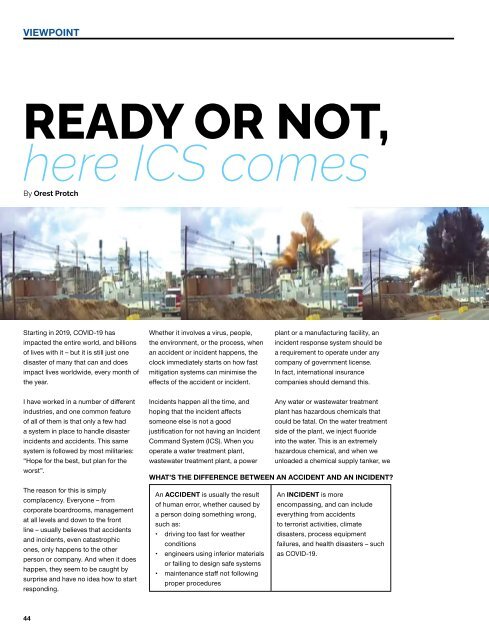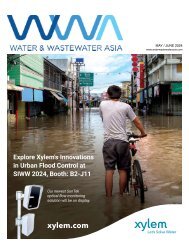Water & Wastewater Asia May/Jun 2021
Water & Wastewater Asia is an expert source of industry information, cementing its position as an indispensable tool for trade professionals in the water and wastewater industry. As the most reliable publication in the region, industry experts turn this premium journal for credible journalism and exclusive insight provided by fellow industry professionals. Water & Wastewater Asia incorporates the official newsletter of the Singapore Water Association (SWA).
Water & Wastewater Asia is an expert source of industry information, cementing its position as an indispensable tool for trade professionals in the water and wastewater industry. As the most reliable publication in the region, industry experts turn this premium journal for credible journalism and exclusive insight provided by fellow industry professionals. Water & Wastewater Asia incorporates the official newsletter of the Singapore Water Association (SWA).
You also want an ePaper? Increase the reach of your titles
YUMPU automatically turns print PDFs into web optimized ePapers that Google loves.
VIEWPOINT<br />
READY OR NOT,<br />
here ICS comes<br />
By Orest Protch<br />
Starting in 2019, COVID-19 has<br />
impacted the entire world, and billions<br />
of lives with it – but it is still just one<br />
disaster of many that can and does<br />
impact lives worldwide, every month of<br />
the year.<br />
Whether it involves a virus, people,<br />
the environment, or the process, when<br />
an accident or incident happens, the<br />
clock immediately starts on how fast<br />
mitigation systems can minimise the<br />
effects of the accident or incident.<br />
plant or a manufacturing facility, an<br />
incident response system should be<br />
a requirement to operate under any<br />
company of government license.<br />
In fact, international insurance<br />
companies should demand this.<br />
I have worked in a number of different<br />
industries, and one common feature<br />
of all of them is that only a few had<br />
a system in place to handle disaster<br />
incidents and accidents. This same<br />
system is followed by most militaries:<br />
“Hope for the best, but plan for the<br />
worst”.<br />
The reason for this is simply<br />
complacency. Everyone – from<br />
corporate boardrooms, management<br />
at all levels and down to the front<br />
line – usually believes that accidents<br />
and incidents, even catastrophic<br />
ones, only happens to the other<br />
person or company. And when it does<br />
happen, they seem to be caught by<br />
surprise and have no idea how to start<br />
responding.<br />
Incidents happen all the time, and<br />
hoping that the incident affects<br />
someone else is not a good<br />
justification for not having an Incident<br />
Command System (ICS). When you<br />
operate a water treatment plant,<br />
wastewater treatment plant, a power<br />
Any water or wastewater treatment<br />
plant has hazardous chemicals that<br />
could be fatal. On the water treatment<br />
side of the plant, we inject fluoride<br />
into the water. This is an extremely<br />
hazardous chemical, and when we<br />
unloaded a chemical supply tanker, we<br />
WHAT’S THE DIFFERENCE BETWEEN AN ACCIDENT AND AN INCIDENT?<br />
An ACCIDENT is usually the result<br />
of human error, whether caused by<br />
a person doing something wrong,<br />
such as:<br />
An INCIDENT is more<br />
encompassing, and can include<br />
everything from accidents<br />
to terrorist activities, climate<br />
• driving too fast for weather<br />
conditions<br />
disasters, process equipment<br />
failures, and health disasters – such<br />
• engineers using inferior materials<br />
or failing to design safe systems<br />
as COVID-19.<br />
• maintenance staff not following<br />
proper procedures<br />
44


















